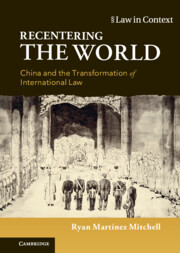
Image source: CUP
Description:
Recentering the World recovers a richly contextual, detailed history of Western-imposed legal structures in China, as well as engagements with international law by Chinese officials, jurists, and citizens. Beginning in the Late Qing era, it shows how international law functioned as a channel for power relations, techniques of economic domination, as well as novel forms of resistance. The book also radically diversifies traditionally Eurocentric accounts of modern international law's origins, demonstrating how, by the mid-twentieth century, Chinese jurists had made major contributions to international organizations and the UN system, the international judiciary, the laws of armed conflict, and more. Drawing on extensive archival research, this book is a valuable guide to China's often conflicted role in international law, its reception and contention of concepts of sovereignty, property, obligation, and autonomy, and its gradual move from the 'periphery' to a shared spot at the 'center' of global legal order.
Table of contents:
Introduction: 'In the Nineteenth Century, There was No International Law'Part I. Preserving Stateliness, 1850–1894:1. Universal Prosperity2. Synarchy3. Vast ImperiumPart II. Asserting Sovereignty, 1895–1921:4. The Public Law of Planet Earth5. The Problem of Equality6. Reconstituted HierarchiesPart III. Internationalisms, 1922–2001:7. Changing Circumstances8. New Orders9. Perpetual PeaceConclusion: From Object to Subject? – China in a World of InstitutionsGlossary of Chinese and Japanese NamesBibliographyIndex
About the author:
Ryan Martínez Mitchell is an associate professor at the Faculty of Law of the Chinese University of Hong Kong. He holds a J.D. from Harvard Law School and a Ph.D. in Law from Yale University. His scholarship on China and international law has appeared in a number of leading scholarly journals.
More information can be found here.
(Source: ESCLH blog)
